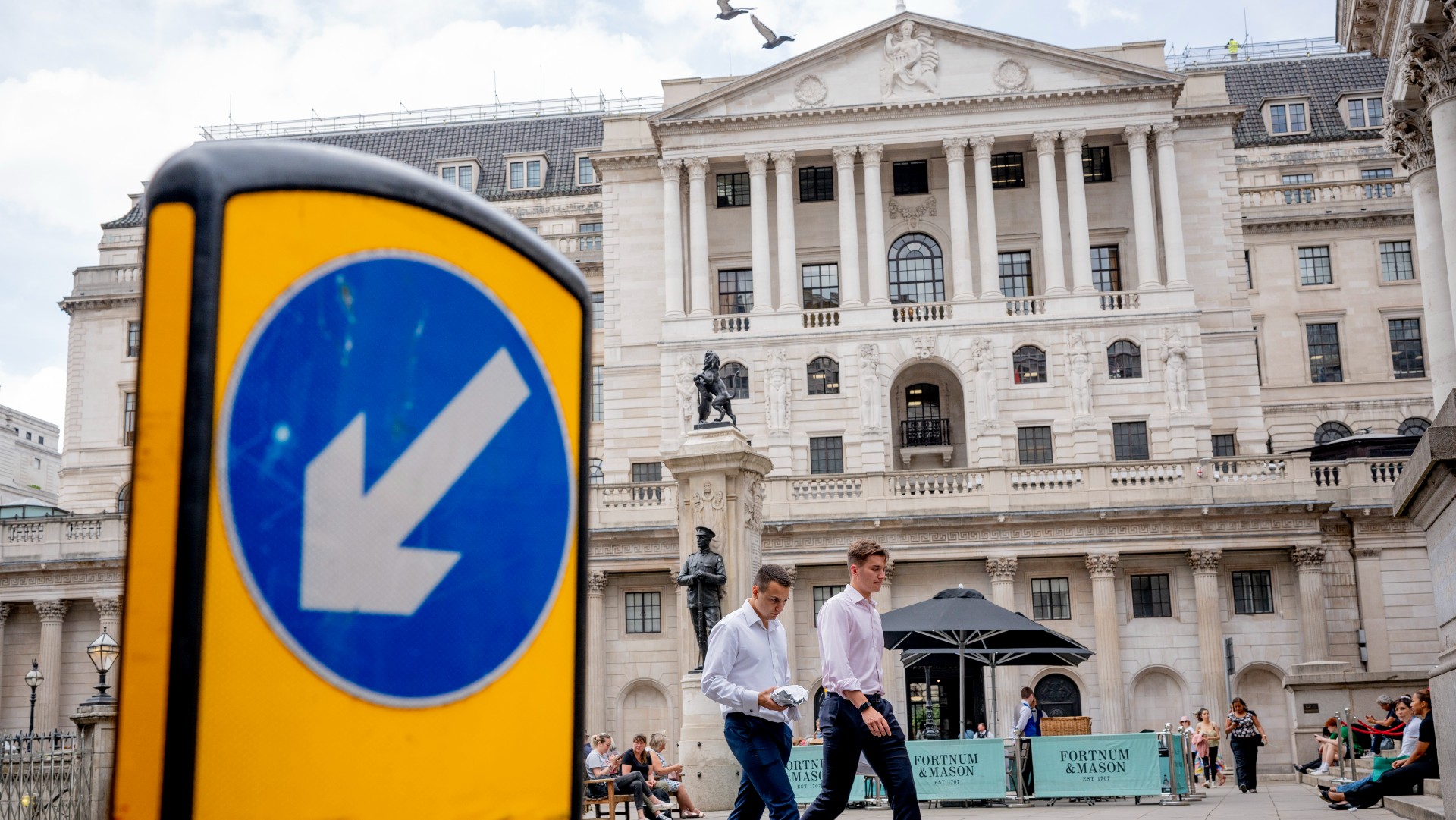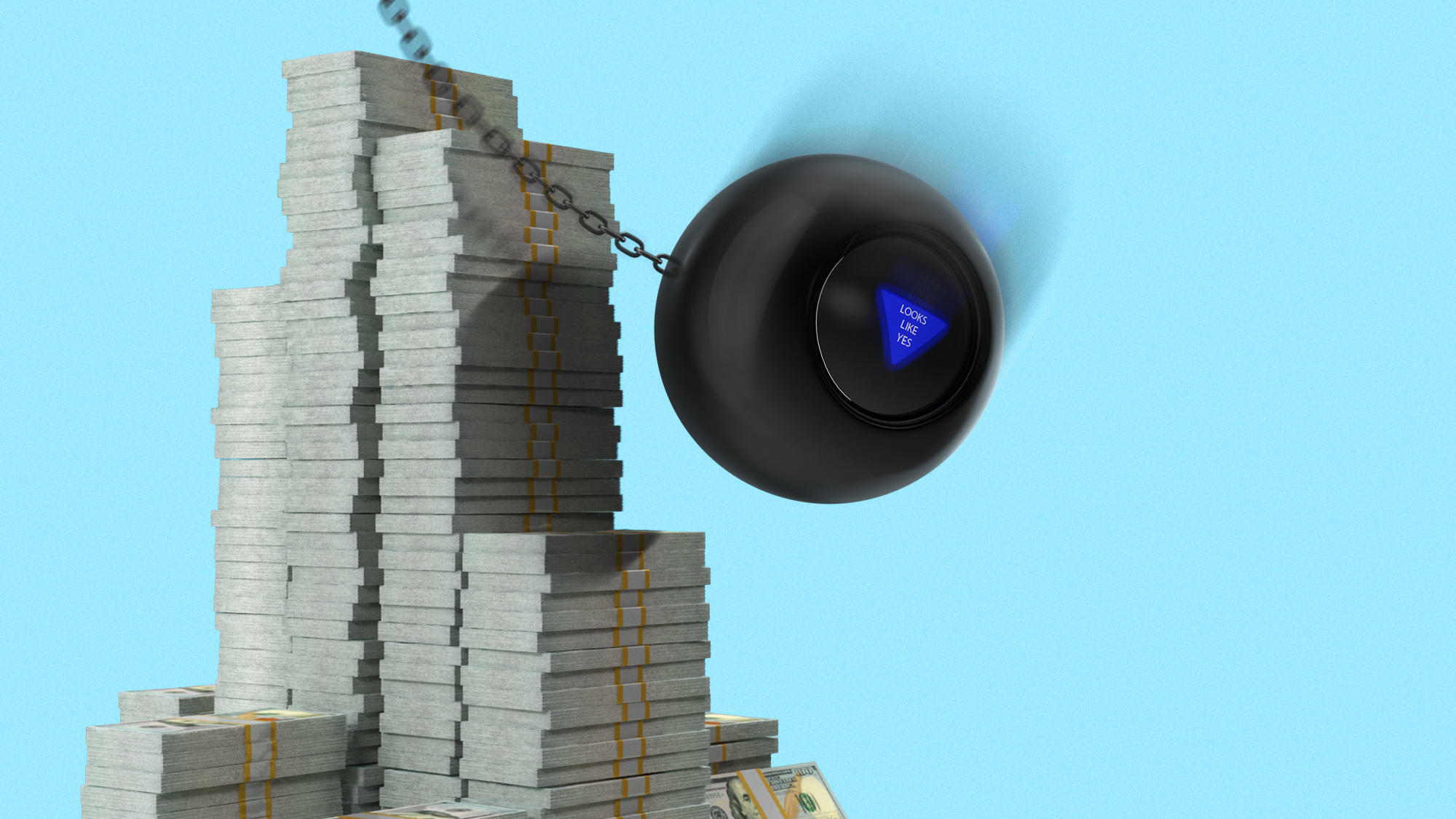Can looming UK recession be averted?
Experts say indirect impacts of Queen’s death could tip fragile economy over the edge

A free daily email with the biggest news stories of the day – and the best features from TheWeek.com
You are now subscribed
Your newsletter sign-up was successful
With the nation’s focus on the death of the Queen and accession of King Charles III, the spectre of imminent UK recession has slipped under the radar.
Amid the outpouring of grief for Her Majesty, it has “been easy to disregard the warning from economists that next Monday's funeral for the late Queen – an additional bank holiday, with workplaces and shops closed – will tip the UK into a technical recession”, wrote Allegra Stratton for Bloomberg.
“This must be the most dismal collision of economic analysis with national spirit,” added Stratton, who served as Downing Street press secretary under Boris Johnson.
The Week
Escape your echo chamber. Get the facts behind the news, plus analysis from multiple perspectives.

Sign up for The Week's Free Newsletters
From our morning news briefing to a weekly Good News Newsletter, get the best of The Week delivered directly to your inbox.
From our morning news briefing to a weekly Good News Newsletter, get the best of The Week delivered directly to your inbox.
The UK economy contracted by 0.1% in the second quarter of the year, and latest Office for National Statistics figures show that GDP climbed to just 0.2% in July – fuelling fears of a further decline in the third quarter, which would signal recession.
Will the Queen’s funeral be the tipping point?
Economists are warning that the closure of businesses nationwide for the funeral bank holiday, combined with the impact of the ten-day mourning period on consumer sentiment, “raises the risk of Britain’s already-faltering economy falling into a recession sooner than expected”, The Times reported.
According to the London Evening Standard, the combined cost to the UK economy of “funeral expenses, bank holidays and the coronation of King Charles III next year” could be £6bn or more. Experts estimated the hit to the economy of Monday’s bank holiday alone would be around £2bn.
The Bank of England last month predicted that a recession would begin in the fourth quarter of 2022, as businesses and families continue to struggle with steep price hikes after inflation hit a 40-year high in June.
A free daily email with the biggest news stories of the day – and the best features from TheWeek.com
Economists across the City are now revising their models as the Queen’s death adds “further uncertainty to forecasts”, said The Times.
Investment bank Panmure Gordon had expected that UK GDP would grow by 0.1% in the current quarter, but is now predicting -0.1%. Deutsche Bank also expects GDP growth to be either negative or flat, after previously predicting 0.2% growth.
What about Liz Truss’ energy plan?
The new prime minister suggested during her leadership campaign “that her economic agenda could avoid recession”, said Kate Andrews in The Spectator. “But one of the (many) gambles attached to these comments was what had already happened to the economy before she entered No. 10.”
Truss announced last week that energy bills for everyone in the UK would be frozen at £2,500 for two years, at a cost of around £150bn.
But some economists have warned that Truss’s energy support package “is unlikely to lift it out of its slump any time soon”, City A.M. reports.
“The disappointingly small rebound in real GDP in July suggests that the economy has little momentum and is probably already in recession,” said Paul Dales, chief UK economist at consultancy Capital Economics. “The government’s utility price freeze is unlikely to change that.”
Not everyone agrees, however. Bloomberg analysts Andrew Atkinson and Philip Alrick wrote that “we think the government’s £150bn energy support package means the recession won’t last over the winter”.
What is the long-term outlook?
Looking further ahead, the picture becomes even less clear. Truss’s “plan is likely to curb inflation but force the Bank of England to keep interest rates higher for longer, potentially leading to a contraction next year”, said Stratton on Bloomberg.
At 1.75%, interest rates are currently at their highest level since December 2008. The Bank’s Monetary Policy Committee had been widely expected to further raise rates to up to 2.25% this week, but the decision has been pushed back to 22 September following the Queen’s death. The Bank has already lifted borrowing costs six times in a row.
US investment bank Goldman Sachs has predicted that rates may reach as high as 3.25% by the end of this year, while consultancy Capital Economics is a predicting a peak of 3%.
And some experts have predicted that interest rates may be hiked to at least 4.25% by the middle of 2023, in a bid to prevent the bill for energy support from stoking inflation – heaping further pressure on consumers.
-
 Why is the Trump administration talking about ‘Western civilization’?
Why is the Trump administration talking about ‘Western civilization’?Talking Points Rubio says Europe, US bonded by religion and ancestry
-
 Quentin Deranque: a student’s death energizes the French far right
Quentin Deranque: a student’s death energizes the French far rightIN THE SPOTLIGHT Reactions to the violent killing of an ultraconservative activist offer a glimpse at the culture wars roiling France ahead of next year’s elections
-
 Secured vs. unsecured loans: how do they differ and which is better?
Secured vs. unsecured loans: how do they differ and which is better?the explainer They are distinguished by the level of risk and the inclusion of collateral
-
 Is the US in a hiring recession?
Is the US in a hiring recession?Today's Big Question The economy is growing. Job openings are not.
-
 The end for central bank independence?
The end for central bank independence?The Explainer Trump’s war on the US Federal Reserve comes at a moment of global weakening in central bank authority
-
 Is the UK headed for recession?
Is the UK headed for recession?Today’s Big Question Sluggish growth and rising unemployment are ringing alarm bells for economists
-
 Why has America’s economy gone K-shaped?
Why has America’s economy gone K-shaped?Today's Big Question The rich are doing well. Everybody else is scrimping.
-
 Should Labour break manifesto pledge and raise taxes?
Should Labour break manifesto pledge and raise taxes?Today's Big Question There are ‘powerful’ fiscal arguments for an income tax rise but it could mean ‘game over’ for the government
-
 Is the US in recession?
Is the US in recession?Today's Big Question ‘Unofficial signals’ are flashing red
-
 What are stablecoins, and why is the government so interested in them?
What are stablecoins, and why is the government so interested in them?The Explainer With the government backing calls for the regulation of certain cryptocurrencies, are stablecoins the future?
-
 Doing the hustle: Are side gigs a sign of impending recession?
Doing the hustle: Are side gigs a sign of impending recession?In the Spotlight More workers are 'padding their finances while they can'